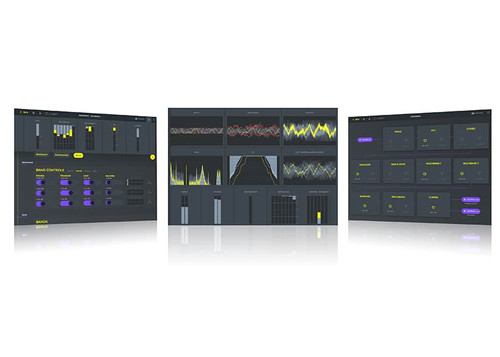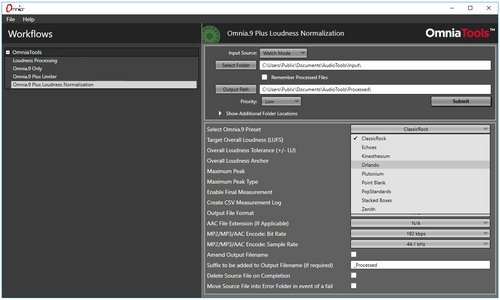Overview
OmniaSST FM Audio Processor Software transforms Windows PCs into high-end audio processors. Based on a powerful processing engine, OmniaSST is the first processor to support the Telos Alliance's revolutionary Omnia µMPX® codec. Omnia µMPX, a specialized codec purpose-built for FM radio, is able to transport high-quality Multiplexed FM signals over a small 320kbps data pipe. Reduced data requirements mean high-quality multiplexed audio and RDS signals can be directly routed over IP from your processor into a decoder application, opening up tremendous possibilities for efficient MPX audio transport.
OmniaSST FM Audio Processor Software is the only processor with the 3 Ds for your audio needs: Declipper, Delossifer, and Dehummer. With Declipper, OmniaSST repairs incoming audio, optimizing it before it hits compression, limiting, and final processing stages, Delossifer repairs the sound of lossy compressed audio such as MPEG2/MP3 material. While Dehummer removes unwanted sounds such as 50/60 Hz hum from bad cables. These remarkable pre-processing tools result in clean, loud, and open sound.
Finally, OmniaSST FM Audio Processor Software includes purpose-built Omnia presets, FM pre-emphasis, stereo and RDS encoding, and shares the same FM reception-improving composite final clipper as found on the Omnia 9SG. Using an i7 class processor, latency can be reduced to as low as 5ms. A streamlined, HTML-5 based GUI means easy, intuitive operation
Features
Audio Processing Features
-
Low-Latency Performance – Using an i7 class processor, latency can be reduced to as low as 5ms.
-
The Perfect Declipper – A unique filter, also found in our Omnia.9 and 11 flagship processors. It detects and reconstructs clipping-damaged audio (distortion caused by too-loud input levels and overly aggressive mastering), prevalent in music.
-
Delossifier – Improves the sound of lossy encoded audio, such as MP3- and MPEG2-encoded audio.
-
Dehummer – Removes constant tones such as a 50/60 Hz hum on the fly.
-
Lowpass Filter – The extremely steep phase linear lowpass filter can be used to cut off frequencies that cannot be broadcast, removing unneeded signals from streaming audio, FM and AM transmission.
-
Hiss Reduction Filter – A powerful hiss-reduction filter that tackles hiss while leaving adjacent content alone. Especially useful when playing older songs or other noisy content.
-
Natural Dynamics – Boosts transients. This mainly boosts percussion instruments, adding more dynamics, which gives the rest of the processing chain more to work with.
-
Automatic Gain Control (AGC) – The ITU.1770-based AGC keeps the sound compliant to a defined loudness level.
-
Bass Harmonics – This filter increases the bass level without increasing the maximum amplitude of the bass, and adds harmonics that make the bass more audible on speakers with poor bass reproduction.
-
Phase Delay – Purposely adds phase-nonlinearity. Can be used among others to generate a more boomy bass.
-
Bass in Your Face – Intelligently adds missing subharmonics.
-
Absolute Highs – Reconstructs missing highs if damaged or removed by lowpass filters.
-
2-9–Band Multiband Compressor / Limiter, x2 – OmniaSST has two multiband compressors that can be used in series. They have a very natural, pleasant, and non-fatiguing sound. Depending on the content, they move very quickly when they need to and slowly when they can.
-
Phasing Error (AZIMUTH) Correction Filter – Detects and repairs phase-shift errors that are often present on tape recordings and some badly mastered CDs. These phasing errors can make listening very unpleasant, and can also cause severe artifacts when converting sound to mono, encoding it using a lossy codec, or when playing it on a surround system. This filter automatically detects and repairs such errors. For FM transmissions this can reduce multipath distortion and improve the audio quality when the radio blends to mono.
-
Stereo Booster – Boosts the stereo width. It can be configured to not alter the total sound content.
-
Stereo to Mono Conversion – Converts stereo to mono without removing sounds that normally cancel out during a mono sum. This leaves mono sounding just as full and powerful as the original stereo sound.
-
Distortion Masking Clipper – The same clipper that’s available in the Omnia.9sg. Now with a louder and cleaner “Rules are made to be broken” mode.
FM Transmitter Features
OmniaSST FM Audio Processor Software is the first product to generate and decode Omnia’s proprietary µMPX™ multiplex audio codec, allowing you to transport high-quality Multiplexed FM signals over a small 320kbps data pipe, slashing bandwidth needed for MPX by 83%! Reduced data requirements mean high-quality multiplexed audio can be economically routed from an audio processor, over IP, and directly to a decoder application, opening completely new possibilities for studio to transmitter links.
µMPX includes stereo and RDS data, which can be sent to the FM transmitter using a good-quality 192kHz capable sound card. No separate hardware stereo coder or hardware RDS encoder is needed.
The following FM transmitter specific options are provided:
-
FM Pre-Emphasis Filter – Pre-emphasizes the sound, which is needed for FM transmissions.
-
Flexible Outputs – Flexible outputs mean OmniaSST can output both the pre-emphasized and the de-emphasized sound, or the pre-emphasized sound and a partially separately processed streaming sound.
-
FM Stereo Encoder – The software FM stereo encoder generates a high-quality MPX signal including stereo information, which can be fed directly into an FM transmitter.
-
FM RDS Encoder – The software RDS encoder enables broadcasting RDS text without using a separate hardware RDS encoder.
-
Composite Clipper – The composite clipper in OmniaSST can squeeze out multiple dBs of extra loudness with highest sonic quality. The stereo pilot tone and RDS signal are not affected by this filter, and the upper and lower sideband are perfectly symmetrical, so the MPX signal that comes out complies perfectly to loudness standards.
-
ITU-R.BS-412 Limiter – Mandatory for several European countries. The BS412 limiter in OmniaSST has virtually no effect on the sound (no extra clipping, no pumping, no gain riding), but still holds the output level up to the allowed maximum.
-
ITU-R SM.1268 Clipper, Multipath Clipper – OmniaSST contains a built-in software based exciter and spectrum analyzer, which are used to analyze what the output signal will look like after FM modulation. The spectrum analyzer feeds back into the clipper in multiple stages, to very precisely control the resulting spectrum, strictly adhering to and even exceeding what ITU-R SM.1268 recommends.
















